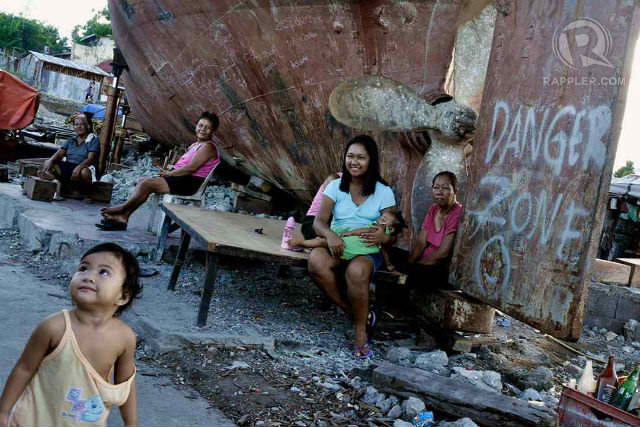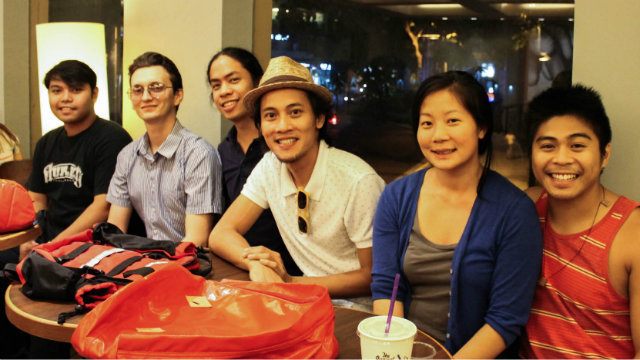SUMMARY
This is AI generated summarization, which may have errors. For context, always refer to the full article.

MANILA, Philippines – Half a year after Typhoon Yolanda (Haiyan), progress in the area continues to be sluggish.
Despite the inflow of government and international aid, several residents have yet to feel this, with the extent of damage overwhelming the outpour of relief. Survivors continue to live in subhuman conditions and the city is unprepared for another disaster. (READ: Homeless, jobless, hungry)
Recently, a family died from a fire in the temporary “tent city” that 3,700 survivors call home. (READ: No kid survives Tacloban tent fire)
With the prolonged recovery, those in the private sector have tried to fill the gap of government inefficiency. For instance, 9 corporations have pledged to rehabilitate Yolanda-stricken areas. (READ: 9 giant firms lead Yolanda rehabilitation)
The survivors, however, are also picking themselves up. They fashion their own boats from refrigerators and rebuild their houses with whatever materials they find.
They simply want to move on.
Innovative ways

“The idea is to get back to normal,” Justin Capen, a financial and business consultant, said.
This mindset is the force behind Taclob, a social enterprise founded by Justin Capen, actor and filmmaker Jourdan Sebastian, and businessman and native Taclobanon Kenneth Uy.
Taclob aims to “create jobs by making something that the world wants, and that the community needs” in Tacloban.
This is achieved through the eco-friendly, fire engine-red backpack Compassion, which will be manufactured by Yolanda survivors in Tacloban. It comes along with nylon orange Courage, which is donated to schoolchildren and doubles as a flotation device.
Factory workers will also be trained through Technical Education and Skills Development Authority (TESDA) for industrial sewing.
“We want the survivors to be able to seek other forms of livelihood outside our factory,” Capen shared.
“We are simply giving them the opportunity to rebound from their current situation.”
Empowering survivors
Sebastian reiterates that Tacloban was an up and coming city before the storm surge, with manufacturing as one of its industries.
It is no surprise that Taclobanons take any opportunity to be self-sufficient.
“That’s really the message that we’ve been getting, that we appreciate all of the relief, we appreciate all of the support,” he said.
Capen stressed the survivors must be able to get back on their feet.
The team paired with eco-friendly bag manufacturer Khumbmela to ensure that the bag embodied disaster resilience, addressed climate change, and fit any lifestyle.
“We don’t want a sob story. We want something really trendsetting, iconic, and that’s empowering,” Sebastian said.
.jpg) This is evident in the eye-catching Compassion, which is made from upcycled Japanese tarpaulin and pre-loved jeans from Germany.
This is evident in the eye-catching Compassion, which is made from upcycled Japanese tarpaulin and pre-loved jeans from Germany.
Proceeds from Taclob will also support workshops on disaster preparation, climate change, and trauma mitigation with partner organizations.
“Studies show, during disasters, 4-6 months after a major disaster strikes, that’s when the emotional problems come out,” Sebastian explained. “For them to be efficient, for them to be productive, we have to address their emotional well-being.”
.jpg) Emotional trauma among children is acddressed in the design of Courage, which resembles a life vest, with its water resistant fabric and reflective stripe.
Emotional trauma among children is acddressed in the design of Courage, which resembles a life vest, with its water resistant fabric and reflective stripe.
“That’s why we call it Courage. The children can continue on. They know that if another storm is coming in, they can put their empty PET water bottles here and they already have a floating backpack,” Capen expounds.
Compassion in crowdsourcing
Crowdsourcing is the team’s avenue for gaining funds and assistance with the project. The number of supporters grow each day, either through promotions in social media or Taclob’s Indie-gogo page.
Soon, a website will be up to take in orders.
It has also generated attention among celebrities.
“We gathered around 70 celebrities, icons, influencers, and they all jumped in,” Sebastian said. These ambassadors have given $100 to get Compassion and give Courage to a child.
Even the core team was formed through crowdsourcing.
Dhanvan Saulo of Khumbmela recounts that he came across a Facebook post by Sebastian. Intrigued, he volunteered to help with only a vague idea of the project. Discussions about the vision and 5 prototypes later, the choice for Compassion was unanimous.
Ly and Camarce, a Fil-Am, left corporate America initially to help with relief efforts in Iloilo. During their stay in the Philippines, they were referred to Sebastian’s Facebook post for another project.
But when Sebastian failed to meet them, they instead met Capen, who had a bright red bag that caught their attention. But discovering the story behind it compelled them to be involved.
“Every Filipino we met says two things about the Philippines: issues about the government and jobs. So when we started this initiative that creates jobs and promotes eco-fashion, we thought, ‘this is meant to be,’” Camarce said.
Social enterprise
Taclob is an apt name for the bags because not only is it short for Tacloban, it literally means “to cover.” These bags are a form of security to survivors, providing livelihood and a rescue device.
But ultimately, the Taclob team aims to empower the locals to rebuild their city from the ground up.
“The logo that we have really embodies the vision: a new city, a disaster-resilient city, a clean city,” said Sebastian.
The team also hopes that Taclob can be a model for others to use social enterprise not only in disaster recovery but also in nation-building.
“We really believe that in the Philippines, one of the unique selling propositions can be social enterprises.”
Instead of relying on foreign companies with BPOs and OFWs, Sebastian believes in social responsibility among businesses.
“Social enterprise as an economy, as an industry where causes and advocacies are ingrained into the company for the benefit of mankind: I think that’s something that we can run with.” – Rappler.com
You can also visit Taclob at Facebook and Twitter.
Niña V. Guno is a Rappler intern and a 5th year AB Communication Arts and BS Business Management student from the De La Salle University.
Add a comment
How does this make you feel?
There are no comments yet. Add your comment to start the conversation.